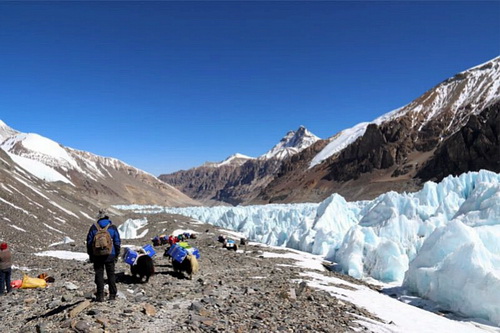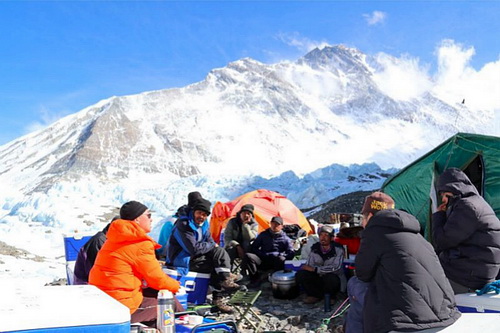Air Pollutants Quicken Glacier Melting: Study
Updatetime:2019-08-02From:
【Enlarge】【Reduce】
Researchers of a joint research team have demonstrated that the air pollutants accelerated the glaciers melting in the Third Pole which covers the Qinghai-Tibet Plateau and surrounding areas, storing abundant snow and glaciers.
Researchers gather for a joint research project on a snow mountain. Photo provided by the research team
Researchers have demonstrated that the air pollutants accelerated the glaciers melting in the Third Pole.
The Third Pole covers the Qinghai-Tibet Plateau and surrounding areas, storing abundant snow and glaciers. This region has high rates of glacier melting and affects water supplies in Asia.
Researchers from the Chinese Academy of Sciences, International Center for Integrated Mountain Development (ICIMOD) and Stockholm University introduced a monitoring and research framework and network to link atmospheric pollution and cryospheric changes within the Qinghai-Tibet Plateau.

A researcher collects glacier samples. Photo provided by the research team
The network focuses on black carbon aerosols, brown carbon aerosols, dust, heavy metal and persistent toxic substances, said their recent paper published in the journal National Science Review.
The results showed that the air pollutants reduced the albedo of the ice and snow surface and accelerated the melting of the cryosphere.

Researchers go back to their camp after collecting samples. Photo provided by the research team
The data from 2015 to 2016 showed the duration of snow cover on the Qinghai-Tibet Plateau shortened three to four days due to the accumulation of black carbon and dust.
Meanwhile, the heavy metal and persistent toxic substances can be released with melting glaciers and bring risks for the regional environment and ecosystem. (Xinhua)
Appendix





